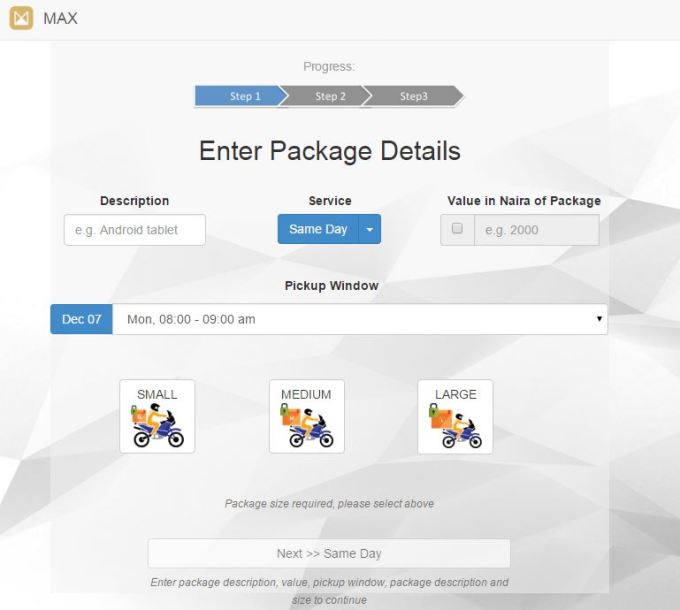Adetayo Bamiduro had to convince his co-founder Chinedu Azodoh that starting an e-commerce site wasn’t necessarily the best idea — at least, not yet. Instead, the two decided to start Metro Africa Xpress (or MAX, for short), a last-mile delivery service for urban Africa based in Lagos, Nigeria. MAX is launching onstage today at TechCrunch Disrupt London.
The service gives merchants a way to have their goods delivered to customers within three hours through a platform that can use an API the company built, as well as through text messaging and other platforms. Merchants summon MAX couriers through the platform and MAX charges the merchants based on distance instead of weight and other factors that logistics companies often use. In addition, traditional logistics companies currently can’t offer that kind of speed, which is largely the focus of MAX, Azodoh said.
“We hated the way things are done today — you have kilograms, measuring, everyone wastes time,” he said. “Typically, the whole process wasn’t well-organized or well thought out, so for us we do it to simplify the process and make it easy to use our platform.”
MAX does have crowdsourced couriers, but it also has a baseline staff of people to deliver packages on branded motorcycles. The couriers they employ full-time are paid on a salaried basis, while its crowdsourced couriers — if the demand is there — get paid per delivery. Around 70% of the drivers are full-time, Azodoh said on stage.
The pair is from Nigeria, and they went through TechStars (one of the first to come out of Nigeria). Azodoh said they built MAX in Africa to help encourage others on the continent to start companies.
“When you look at the landscape, there weren’t many successful companies that were African-owned, it made it difficult for younger people to look up,” Azodoh said. “Cities in Africa have some of the highest urbanization rates compared across the world. With more and more coming into the system, it’s very important we have things that you can look up to, and say hey, if MAX has done it, I can do it.”
Another reason they built the company in Africa is they want to enable retailers to grow by giving them the tools to actually deliver their goods — which is a natural precursor to growing, you’d expect. On the e-commerce side, one of the reasons it hasn’t hit the penetration rate that is seen in the UK and the United States is that there isn’t a good infrastructure for delivery, he said.
“When you look at comparable markets, the growth of e-commerce has directly correlated with the appearance of strong last-mile delivery,” Azodoh said. “Our main goal is to empower retailers and consumers across the company. The most effective way to do that is to provide last-mile delivery. That provides a real way of commerce workflow.”

Of course, there is the elephant in the room: Uber. The company could end up going after the same space that MAX is going after, given its history of being an aggressive — and well-funded — company with a knack for handling trips from one point to another. Azodoh knows that there’s a chance that Uber could be gunning for them eventually, but said he’s just heads down working on the company right now.
“The great thing has been focusing on executing and executing like crazy,” he said. “We want to get things done as fast as possible. We’re not too focused on what the competitors are doing. We love them and respect them; we don’t use that as a scale of measurement of our performance.”